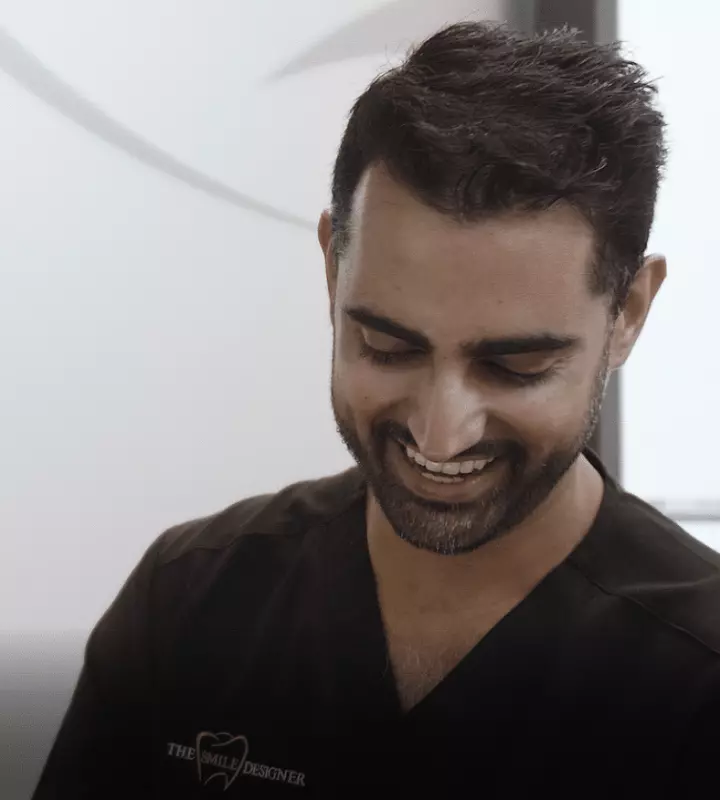Snoring
What Dental Issues Causes Snoring & Can it be Treated?
You may wonder how snoring could have anything to do with oral health care. Snoring is a common problem caused by various factors, including dental issues. These issues include concerns such as misaligned teeth, a large overbite, or a small jaw can contribute to snoring by narrowing the airway and making it more difficult for air to flow through. If you are experiencing snoring, it may be beneficial to consult a dentist or sleep to determine if jaw and teeth issues contribute to the problem.
Common Causes of Snoring
Snoring happens for a variety of reasons, including dental concerns. Some common causes include:
01
Obstruction in the airway
This can be caused by a deviated septum, enlarged tonsils or adenoids, or nasal polyps.
02
Weight gain
Being overweight can cause extra tissue to build up in the throat, narrowing the airway and making airflow more difficult.
03
Alcohol consumption
Drinking alcohol can relax the muscles in the back of the throat, making it more likely for the airway to become blocked.
04
Smoking
Smoking can cause inflammation and swelling in the airway, making the air more difficult to flow through
05
Sleep position
Sleeping on your back causes the tongue and soft palate to collapse to the back of the throat, causing the airway to block.
06
Dental issues
Misaligned teeth, a large overbite, or a small jaw can contribute to snoring by narrowing the airway and making it more difficult for air to flow through.
07
Age
As you age, the muscles in the throat become less toned and are more likely to collapse, which can cause snoring.
Dental Concerns that Affect Snoring
When experiencing issues with your jaw or teeth that need treatment, they are likely to impact your snoring significantly. Some of these include the following:
01
Misaligned Jaw
A misaligned jaw can affect snoring by narrowing the airway, making it more difficult for air to flow freely. This can cause the airway to become partially blocked, leading to the vibration of the soft tissues in the throat and mouth, which results in snoring.
In addition, a misaligned jaw can also cause tension in the muscles of the throat and jaw, contributing to snoring. If you have a misaligned jaw and are experiencing snoring, it is essential to consult our dental clinic to determine the best course of treatment.
02
Missing Teeth
Missing or broken teeth can cause snoring by altering the shape and structure of the jaw and mouth. When teeth are missing, the surrounding teeth can shift and move out of their proper alignment, narrowing the airway and making it more difficult for air to flow through freely. This can lead to vibration of the soft tissues in the throat and mouth, resulting in snoring.
Additionally, when teeth are missing, the muscles and soft tissues in the jaw and throat may have to work harder to keep the jaw stable, leading to tension and fatigue in these muscles and contributing to snoring.
Broken teeth can also cause snoring by altering the shape and structure of the jaw and mouth. If a damaged tooth isn’t repaired, it can cause the surrounding teeth to shift, leading to snoring.
Our team may suggest treatments such as all on 4 implants or bridges to fix the problem. Sometimes, a dentist may refer you to an ENT or sleep for further evaluation.
03
Teeth Grinding
When people grind their teeth (Bruxism), they may put excessive pressure on the jaw and surrounding muscles. This can cause the jaw to become misaligned and the muscles to become tense, narrowing the airway and preventing air from flowing freely, resulting in snoring.
Teeth grinding can also cause wear on the teeth, which can change the shape of the bite and affect the alignment of the jaw, also leading to snoring.
It’s essential to visit our Preston dental clinic if you suspect you have bruxism. We may suggest treatments such as night guards to prevent teeth grinding and jaw repositioning splints to help alleviate jaw pain and muscle tension.
04
Crowded Teeth
When teeth are crowded, they can push against each other and cause the jaw to become misaligned. This can narrow the airway, resulting in snoring.
Crowded teeth can also cause tension in the muscles of the jaw and throat, along with causing changes to the shape of the soft palate and tongue, which can also contribute to snoring.
Seek Dental Treatment for Snoring Problems
Seeking treatment is essential for snoring problems because a dentist can identify and treat the underlying cause of the snoring issue. Dentists have personalised training and expertise in the structure and function of the jaw, teeth, and mouth, which allows them to identify problems that can affect the airway and lead to snoring.
For example, a dentist can identify and treat issues such as a misaligned jaw, missing or broken teeth, teeth grinding, or crowded teeth, which can all contribute to snoring. Treatment such as dental implants, bridges, night guards, jaw repositioning splints, and orthodontic treatments such as braces or Invisalign can help to correct the underlying problems and improve the alignment of the jaw, which can help to alleviate snoring.
Dentists can also identify and refer patients to other , such as sleep physicians, who can conduct further evaluations and provide additional treatments. Seeking treatment from our team can also help prevent more serious health problems, such as sleep apnoea, which can lead to various health problems if left untreated.































